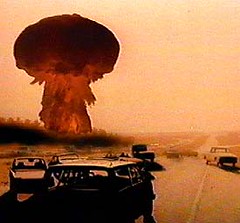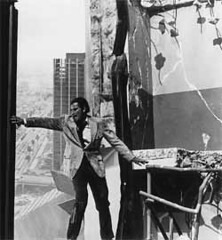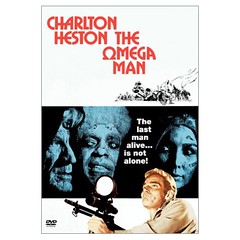
Fox has amped up the fear factor by opening the new season of 24 with a nice little mushroom cloud over Los Angeles. We watch with Jack Bauer from the vantage point of a perfect California cul-de-sac, where Jack has just rescued a family that was naive enough to help out the Arab family next door, only to discover they are *actual terrorists* (the son who makes suburban dad fetch the nuclear detonator amusingly played by the guy from Harold & Kumar Go to White Castle with a healthy dose of Spicoli — a perfect postmodern soldier of Hassan-i-Sabah). The pilot episodes warmed up the suitcase bomb with several scenes of intense torture inflicted by both sides (our hero scarred by Chinese interrogators like a Mel Gibson messiah), detention camps of American citizens straight out of an Alex Jones fever dream, and the lives of millions balanced on edge as the IT guys fight their Dilbert-meets-Melrose Place office battles.

24 has achieved near media ubiquity and all the best ads, reflecting its gift for mainlining the Zeitgeist since it premiered the same month as the September 11 attacks. The genius of 24 is its simulated realism, situating our contemporary geopolitical anxieties in the milieu of of Hollywood's imaginary version of Los Angeles.
The cliffhanger-on-speed plotting of 24 keeps us from ever giving much thought to the colossal anachronism at its narrative heart: the fate of the world persistently determined by the acts of a small group of meta-cops in the L.A. branch of a non-existent domestic ops division of the CIA. We buy it implicitly, our imaginations having been so well-nursed by Hollywood over the past century: Los Angeles is the primary soundstage of our dreams and nightmares. The streets the cops cruise, the deserts the cowboys cross, the planets Kirk beams down to. And, most importantly, the venue where most apocalypses occur. (Just ask Mike Davis.)

The world of 24 operates in accordance with the logic we believe — the narrative logic of police procedurals and disaster movies (informed by hundreds of hours of seminars in which nascent screenwriters internalize Joseph Campbell's distillation of the heroic über-myth). Jack Bauer is a direct descendant of Adam-12 Officer Pete Malloy and his kin, the law and order paranoia of the 60s amplified into the nuke next door (too bad they went for James Cromwell as Bauer's dad rather than Martin Milner). Just as Martin Milner matured from the frat boy beatnik Hemingway of Route 66 to become the lonely dutiful white guy playing patrol car whack-a-mole as the world went mad, Kiefer Sutherland leads the way as the Brat Packer devolved into a post-Clancy fighting machine who's not afraid to torture the enemy when it suits his real-time utilitarian calculus. And 24's terrorists are straight out of the Starsky & Hutch playbook — quintessential California Windbreaker Hoods mixed with a little Yellow peril.

As Hurricane Katrina played out last year, you could hear the collective gears grinding as our actual societal response to the disaster failed to conform to the Hollywood disaster movie paradigm. The master narrative calls for Charlton Heston, the solitary American professional who achieves heroics through self-reliant individualism, in some cases literally holding the world together as it cracks apart. Mass catastrophe, it turns out, is not amenable to resolution by lone Western heroes. That only works on the micro-scale -- the lone yuppie father, loading his family into the Volvo to escape to the Houston Four Seasons Hotel, to the in-laws in a nice white neighborhood in Memphis, barely evading the hordes of vampiric zombies that will rape and eat them all if they fail to make it out before the giant tidal wave hits.

Watching Kiefer Sutherland tackle the horns of the GWOT's dilemmas with the taciturn decisiveness of a rodeo cowboy is far more therapeutic than confronting the failure of reality to conform to the master narrative. See, e.g., the unresolved effort to find Osama in his Blofeldian mountain lair; the failure of Iraq's fractured society to gestate some saccharine Jimmy Stewart fantasy democracy. Nb. the quickly forgotten staged mythology of Jessica Lynch. Kiefer Sutherland's real-world analog may be Pat Tillman.
Is the real challenge for our leaders to do a better job of imposing the American myth on the reality-based community? We await the imminent appearance of "Jack Bauer for President" buttons.
No comments:
Post a Comment